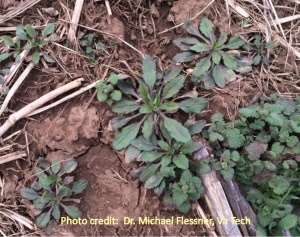By Michael Flessner

Recent mild temperatures and the mild winter are setting the stage for rapid development of marestail/horseweed (Conyza canadensis) this spring. Marestail was particularly troublesome last year in soybeans. Marestail can germinate in both the fall and the spring. It is more likely to overwinter in the rosette stage during mild winters. If you wait until your typical burndown the marestail may start bolting and therefore be more difficult to control. Adding to this difficulty, many marestail populations are resistant to Roundup (and other glyphosate containing products). You should scout your fields targeted for soybeans now to identify overwintering marestail. Marestail control can be achieved with 2,4-D or dicamba now and still offer plenty of time to avoid plant back restrictions (up to 15 days for 2,4-D or up to 28 days for dicamba). Glyphosate resistant weeds and the difficulty in controlling more mature weeds underscore the need to scout fields earlier and use some alternative herbicides in your program. Always consult the product label for specific instructions.